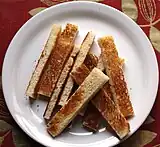 Toast soldiers | |
| Alternative names | Fingers (Ireland) |
|---|---|
| Type | Toast |
| Place of origin | France |
A soldier is a thin strip of toasted bread, reminiscent of a soldier on parade. The shape lends itself to dipping into a soft-boiled egg that has had the top removed.
Soldiers are called mouillettes in French, but also Apprête, mouillons,[1] piquettes in French Normand and lichettes in Lorraine Franconian.
In 2005, The Daily Telegraph reported the invention of a device for cutting bread into soldiers.[2] Shaped cutters to produce soldiers shaped like human soldiers are also available.[3]
History
There is an early reference, but not the TS name, in Bradley 1728 to a "garnish of fry'd Bread, cut the length of one's Finger", as an accompaniment to boiled tench. [4]
In 1868 Alphonse Daudet mentions mouillettes in the novel Le Petit Chose : "A sa gauche, Annou lui taille des mouillettes pour ses oeufs, des oeufs du matin, blancs, crémeux, duvetés".[5]
.jpg.webp)
The specific english term "eggs with soldiers" appears to date only from the 1960s. The modern phrase first appeared in print in 1966 in Nicolas Freeling's novel The Dresden Green (where it is used to eat soup). It is possible that it was either popularised or invented in 1965 in a series of TV commercials for eggs starring Tony Hancock and Patricia Hayes.[6]
See also
References
- ↑ "Mouillon : définition de MOUILLON". www.cnrtl.fr (in French). Retrieved 2018-06-04..
- ↑ Derbyshire, David (14 October 2005). "Boiled egg fan finds the way to make perfect toast soldiers". The Daily Telegraph. Retrieved 7 October 2010.
- ↑ "Caraselle Soldier Egg Cup & Toast Cutter : Amazon.co.uk: Home & Kitchen". www.amazon.co.uk.
- ↑ "Foods of England - Toast Soldiers". www.foodsofengland.co.uk.
- ↑ "Le petit chose".
- ↑ "Foods of England - Toast Soldiers". www.foodsofengland.co.uk. Retrieved 2016-06-16.